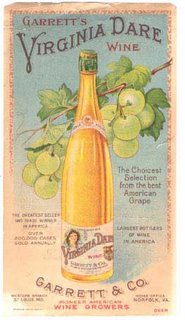
I was startled and quite pleased to see a posting on Fermentation that mentions North Carolina. I lived in N.C. for many years and was following the rise of grape growing and wine production when things were very different.
Back before there was chardonnay, merlot, syrah and cabernet sauvignon (not to mention cab franc, vigionier, et al.) growing in the foothills of the Tarheel State, there was Duplin Winery and the Fussell family making muscadine wine.
I can almost hear the collective groan of wine snobs. In all the wines stores I've worked for, I have always sold Duplin wines, and without fail, the wine snobs would cast a disdainful gaze on the stack of sweet, local wine and snicker. However, the last retailer I worked for went through five to ten cases of Duplin wines a week depending on the time of year.
How many local wineries would like to have those numbers from just ONE wine store? Think about what that says for their statewide numbers.
People like muscadine wine. You may not like it, but you probably don’t like Livingston Cellars Red Rosé either and let me tell you—that stuff flies off the shelf.
As I’ve said before: there is no objective good or bad when it comes to wine. It’s all about what you like.
For the record, I don’t like muscadine wine. But I have a tremendous affection for Duplin and the wines they produce. I marvel at their determination and laugh at their critics. If, as Michael Rolland has implied, a wine’s sales are a measure of its worth, then Duplin wines are mighty worthwhile.
I don’t want to go on and on about this topic, because most wine people just don’t care about muscadine wines. However, I would be remiss if I didn’t mention a few things.
Muscadine grape are native to the South and therefore don’t require the spraying and coddling that Vitis vinifera grapes require in this neck of the woods. That equals good for the environment.
Muscadine wines are, as I’ve already pointed out, very popular. If they get people with sweeter palates interested in wine, then they are good for the wine business as a whole.
Red muscadine grapes have as much as ten times the levels of resveratrol, which has been shown to have a variety of health benefits. Apparently, red muscadine wine is also being linked to immune system health.
In my humble opinion, the potential of muscadine grapes has been vastly underestimated. One can only imagine what the results would be if winemakers applied the same level of diligence to the production of muscadine wines as they apply to European-style wines. Maybe there is some undiscovered gem, like muscadine-based brandy.
Think I need my head examined? Well, check this out.
Firefly Vodka is a new muscadine-based vodka made from grapes grown on Wadmalaw Island, right here in South Carolina. It’s gotten some pretty strong reviews so far. (I’ll have a first-hand report on this, after an extensive interview with a bottle this weekend. Stay tuned.)
As more and more wineries pop up in the Southeast, it will be very interesting what can be done with the humble muscadine.
And to Duplin Winery and the fine folks there, I raise my glass to you. Cheers.


1 comment:
Amen Brother!
Post a Comment